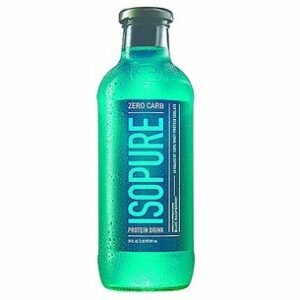Liquid Calories: How Drinking Can Sabotage Weight Loss
People ask me all of the time if things are healthy, and while it seems like a simple question, I am not even sure what "healthy" means. Obviously, if someone is deathly allergic to a food, then it is unhealthy for him or her no matter how packed full of nutrients it is. Also, and I think this can't be said enough, if you are carrying extra body fat, your likelihood of getting sick or dying prematurely is much higher than if your body fat is low. There is no good data out there that shows eating or drinking a certain thing (or not eating or drinking something) clearly causes premature death or disease once it is disassociated from its impact on body fat.
There are studies that show that eating a certain way (I.e. Mediterranean diet) can do things like lower cholesterol (at least among the study subjects). There are studies that correlate a behavior with other things. (Diet soda drinkers are more likely to be overweight than non-diet soda drinkers.) But these observations (and there are tons) do not give you the same kind of big picture as the overweight/illness connection.
Said another way, while there may be a study which shows that drinking regular soda leads to obesity, diabetes, and heart disease, if YOU drink Coke every day but your bodyfat is low, you will probably live longer than someone who avoids processed foods like the plague but has an unhealthy body composition. Any food or drink can help or sabotage your health (and weight loss efforts) depending on the context. If you're stranded on an island and your only food source is a vat of trans fats, it is certainly healthier than dying of starvation. If you can consume things that may be generally considered "unhealthy" as part of a nutrition plan that allows you to reach and maintain/surpass your goals, go for it. Just finished a killer workout class and need to refuel? Read this first...
Post Exercise Class Smoothies - At first glance, these drinks look like a no-brainer addition to a healthy nutrition plan. Organic, cold-pressed fruits and vegetables, superfood extracts, healthy fats and the dew of a four-leaf clover all blended into a convenient drink that is perfect for refueling post workout. Problem: These drinks can be calorie bombs (think 500+) that will more than offset the calories you burned through the activity and not make you feel much fuller than an equal amount of water. All the acai in the world isn't going to change that.Solution: Make sure you know your total calorie goal and choose one with at least 25 grams of protein and a total calorie content that can fit with the rest of your day.
Juice - It's nature's water!! Not really. But they also seem healthy, labeled with buzzwords like "100% Natural" and "Organic" and "No Sugar Added."Problem: It's a boatload of calories. You won’t feel fuller and the giant influx of sugar (unless you eat it with protein and/or fat) will cause an eventual crash which, if you can’t take a nap on your office floor, will lead to you eating more food or drink more juice.Solution: You’re better off spending your calories on food. The satiety factor will make long-term success more likely. But, if you really enjoy juice or regular soda, just make sure you account for it. If you drink it because you think it is healthy, then drink water (or anything that doesn't have calories, possibly even diet soda). I think diet soda is probably fine for 19 out of 20 people and helpful for weight loss in the majority of the 19. Of course, if a dose of aspartame sets off a vicious migraine, then don't consume aspartame.
Protein Drinks - I haven’t met someone who has become obese by drinking only protein shakes. I have met a number of people who have packed on pounds by adding protein shakes to a diet that already has too many calories in it. Quite simply, if a protein shake works to fill you up and allows you to distribute calories toward foods you gravitate to, then have at it. I certainly do. But the laws of thermodynamics apply to you no matter what goes into your mouth, so make sure if you want to lose fat you are not eating more than you're burning.
Conclusion: Like most things, moderation, evaluation of a behavior's maintainability, and common sense will almost never steer you wrong.
Do you have more questions about this blog post or Dr. Charlie Seltzer’s weight loss program? Contact Us, and we’ll get back to you within 24 hours.



